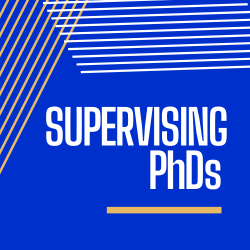This is a guest post by Dr Nicole Brown, Lecturer in Education at UCL Institute of Education (@ncjbrown). She gained her doctorate from the University of Kent as a mature, part-time student balancing the demands of doctoral studies with the challenges of a working life and family commitments. Nicole is a UKCGE Recognised Research Supervisor.

In my recent guest post ‘Dealing with atypical students‘, I highlighted how some students do not fit the usual institutional moulds. However, I have not been entirely upfront, as there are many ways of being ‘atypical’.
The term ‘atypical’ nowadays often refers to students who are neurodiverse, therefore neuro-a-typical. I myself am not neurodiverse, but I am atypical in more than the ways described in that other post. Full disclosure: I have a hearing loss from birth, I was diagnosed with fibromyalgia in 2003, Menières disease in 2004 and Sjögren’s syndrome in 2019. In 2019 I was also told that my hearing loss is so profound that I will soon be eligible for cochlear implants, but on the upside, it looks like the Menière’s disease may have burnt itself out, and the fibromyalgia may always have been a precursor of Sjögren’s.
Throughout my doctoral studies, I found myself navigating pain, brain fog, difficulties with swallowing, Menière’s attacks with severe vertigo and vomiting. And although this was at times frustrating, upsetting, physically and emotionally draining, I managed and coped. However, the reality of doctoral studies is that many students with disabilities, chronic illnesses and/or neurodiversities disappear and drop out. Drawing on my research, I have written about that in the article Ableism in academia: where are the disabled and ill academics?, but also in Disclosure in academia: a sensitive issue, a chapter in the open access edited book Ableism in Academia: Theorising experiences of disability and chronic illnesses in higher education.
In this blog post I draw on my research and my own experiences when I present some strategies for supervisors to support students who have disabilities, chronic illnesses and/or neurodiversities.
Legal framework and moral positioning
Several legal frameworks, such as the UN Convention of the Rights of People with Disabilities or in the UK the Equality Act 2010, require people not to discriminate against individuals with protected characteristics, of which disability is one (see the NADSN position paper for more detail). At the same time, these and other frameworks, such as the social model of disability, and affective model of disability, highlight that we should not view disability as a deficit. Morally, too, we have an obligation to allow and indeed foster different kinds of workings in the academy. Supporting students who have disabilities, chronic illnesses and/or neurodiversities should therefore not be seen as onerous or a choice, but a way to contribute relevant, new knowledge.
Personalised approach
Every disability, illness, condition, neurodiversity is different. Every person is different. It is therefore absolutely key that the approach to how we support individuals is also different. For some people, being Deaf is an identity, others experience deafness as an impairment. There are therefore those who have a hearing loss, whereas others describe themselves as a person who is deaf. There is no right or wrong way about experiencing disabilities, chronic illnesses and/or neurodiversities. So, each conversation needs to be personalised and individualised, which brings me to the next important point: empathy.
Empathy
As supervisors, we need to try and put ourselves into the shoes of our supervisees. Can we imagine navigating the buildings and the hierarchies of academia struggling with sensory overload or blind-folded without support? This does not mean that supervisors should pity their doctoral students with disabilities, chronic illnesses and/or neurodiversities – not at all. But once supervisors realise just how many structural barriers there are, it will be impossible for them to not get upset on behalf of their students or to not try to change attitudes and policies. And the first step to that is empathy.
Disclosure
My research shows how complex disclosure is, and how many factors are involved in whether or not someone shares their disability, illness, condition, neurodiversity. A priority therefore has to be the creation of an atmosphere that allows for disclosure. As supervisors, let’s not focus on how academia is an environment of productivity, efficiency and overwork. Let’s focus instead on collaboration, openness, flexibility. Comments like ‘I regularly work 80-hour weeks’ perpetuate the ableist attitudes in academia that disadvantage and exclude those with disabilities, chronic illnesses and/or neurodiversities. So, let’s make sure that wellbeing and health are at the forefront: ‘Have you taken a break, yet?’
Flexibility
Finally, flexibility. Supervisors need to be flexible regarding how their supervisees work. Fluctuating symptoms, medical appointments, changing energy levels are all part and parcel of the ‘atypical’ experience. For some, this means that they need to record supervisory meetings, for others, it means to have the meetings in the mornings rather than the afternoons.
All in all, it is about good and open communication. As supervisors, we should not be afraid to ask difficult questions, but we do need to be prepared to respond appropriately to our students’ requests. After all, we wouldn’t want to fail them, would we?


Reblogged this on Autism Candles Blog.
LikeLike
I really appreciate it!
LikeLike